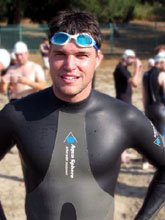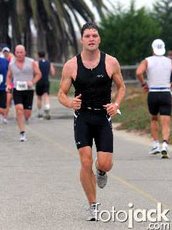 Welcome to another TIP from Dynamic Fitness. I never received any "cancel" requests, so I'm assuming that all of you are up for more of my holier-than-thou fitness counsel...for those recently added to my list, if you don't want to be included, just send me a "Cancel" in the subject line, I'll take the hint, and you can go on with your lazy, slovenly lives. I mean...er...there'll be no hard feelings.
Welcome to another TIP from Dynamic Fitness. I never received any "cancel" requests, so I'm assuming that all of you are up for more of my holier-than-thou fitness counsel...for those recently added to my list, if you don't want to be included, just send me a "Cancel" in the subject line, I'll take the hint, and you can go on with your lazy, slovenly lives. I mean...er...there'll be no hard feelings.So: I'm chugging up a steep grade on Runyon Canyon with a client, and the subject of diet comes up. I had just told her smugly that she should be eating SOMETHING every three hours or so -- preferably something with protein and carbs. Go for too long -- that is, until you get that growly-stomach feeing -- and you go into a catabolic state, meaning, your body starts to feed off its own tissues -- and a fair portion of your own MUSCLE tissue -- to keep going.
As she strode mightily up Runyon's steepest incline, gritting her teeth in determination, my client demanded, "WHY?? WHY DOESN'T IT JUST BURN THE BLOODY FAT, FOR GOD'S SAKE??"
I had no easy answer. Yeah, why doesn't it? After all, fat is much more calorie-dense than muscle, and it doesn't serve any purpose except to store energy -- unlike muscles, of course, which help us plant the harvest and hunt big game. Burning muscle for energy seemed like another design flaw in the human body, like shinbones and hangnails.
So I did a little research, and I discovered a phrase I had never heard before: muscle is "metabolically expensive." Having an athletic physique with a few extra muscular contours is like owning a condo in Vail: fun to show off, nice to use now and then, a great way to impress the ladies/gentlemen, but pricey to maintain. If you get into a financial pinch, that condo is the first asset you're going to unload.
Bringing it back to the body, when you get really hungry, your body thinks you're starving. So to fuel itself, the body starts to burn its own non-essential tissues, and naturally enough, it starts with muscle tissue, because keeping it around is a big drain what the body perceives to be limited resources. Fat, after all, requires very little caloric energy to store, and muscles burn tons of calories, whether you're flexing and pumping them or just sitting around on your glutei.
Now, there's a good side to all this, in that you can use your metabolically demanding muscles to serve you in your quest for a leaner body: all you have to do is make sure to get some food in your belly every three hours or so, and your muscle tissue will be spared. With this steady (but gradual!) supply of healthy calories coming in, the body comes out of panic/starvation mode, loosens its Scrooge-like hold on your fat stores and leaves your muscles alone. And because muscle tissue is so metabolically expensive, it will burn more calories for you, even while you sit there, contentedly watching Out of Practice on CBS (which I highly recommend).
So the formula is pretty simple: eat infrequently and the body catabolizes your hard-earned muscle tissue. Eat something healthy every three hours and the body burns the fat and keeps the muscle -- which, in turn, helps the body to burn even more fat.
Hallelujah.
Have a great weekend, everyone--
Andrew




3 comments:
Although I didn't say "BLOODY" fat, I will say this post actually inspired me to go grocery shopping again and get some healthy, every-three-hour-snacks (apples, oranges, bananas, string cheese, roast turkey)! Although I can't always eat the whole apple or orange or banana... (because I'm not hungry) at least I'm keeping that metabolism up and I don't want to eat a horse at dinner!
Great tip, dude!
Wow, I now know something new. Amazing how the body works vs how we 'think'it works.
Thanks for the info, now lets see if I can put this into my day to day.
I will be back for any new info ya got!
Don't think I entirely agree with this. Though it depends how active you are, and if you are a body builder whether are in the cycle of cutting or building up muscle.
But there is a lot of clinical trials that suggest benefits from short term fasting. Fasts up to 24 hours, (so you eat at least once a day). You get a boost of HGH (human growth hormone) which seeks to preserve protein mass. Obviously continue to exercise/work out during the fasting cycle.
Long term fasting yes you will start to burn muscle not not for shorter periods, and you food up on your non fasting days. If you want to "boost metabolism" then, walk, run, cycle or workout!
Post a Comment